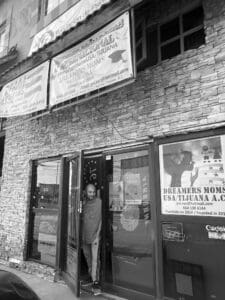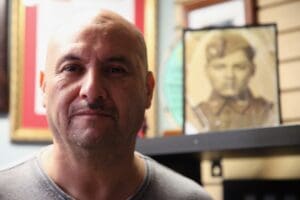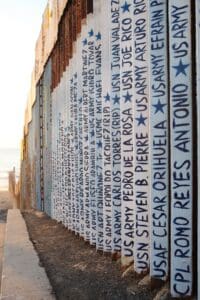Deported Veterans Support House – Hector Barajas
Hector Barajas grew up in the Los Angeles as a lawful permanent resident noncitizen in the United States. In 1995, Barajas enlisted in the Army. During his service he won numerous awards including the Army Commendation Medal and Humanitarian Service Medal. He was honorably discharged in 2001.
In 2010, Barajas who was still a noncitizen was deported to Mexico after he had served a sentence for a crime in 2002. In Mexico, Barajas established the Deported Veterans Support House in Tijuana to offer help to other veterans who’ve been deported.
With significant effort, Barajas was able to gain United States citizenship from Mexico. Today, Barajas still runs the Deported Veterans Support House while he works in the United States. Barajas is also featured in a documentary, Ready for War, which highlights the struggles of deported veterans. Barajas also heavily advocated for deported veterans, leading to the launch for the Biden administration’s Immigrant Military Members and Veterans Initiative in 2021. The program works to make Veterans Administration benefits more accessible for non-US citizen veterans, and to help more deported veterans return to the US if they were deported. The program also works to lessen the number of deported veterans
KBCS’s Mari McMenamin, Dana Schuerholz and Yuko Kodama interviewed Hector Barajas at the Deported Veterans support house in Tijuana, Mexico in 2019.
Producers: Mari McMenamin, Dana Schuerholz, Jesse Callahan and Yuko Kodama. Special thanks to Magdaleno Rose-Avila for inspiring us to take on this story.
Photos: Dana Schuerholz
Local Day of the Dead Events 2021
Auburn Nov 1 – Nov 6
Burien Nov 1- Nov 5
https://www.burienwa.gov/news_events/featured_events/dia_de_los_muertos
Issaquah Nov 2
https://issaquahwa.gov/Calendar.aspx?EID=9833
Seattle
El Centro de la Raza Nov 2
Seattle Center Oct 30 – Nov 7
http://www.seattlecenter.com/events/event-calendar/dia-de-muertos-festival-seattle
Phinney Neighbhood Center Nov 6
https://www.phinneycenter.org/calendar/dia2021/
Border Crossing
The border town of Arivaca, Arizona, is no stranger to migrants crossing through the desert and mountains in hopes for a better life in the U.S. The documentary film Undeterred, shows how militarizing the border can result in migrants dying in the desert and in the neighborhoods of towns on the border. The film was featured at the 2018 Social Justice Film Festival in Seattle. KBCS’s Ruth Bly recorded the panel discussion following the screening.





